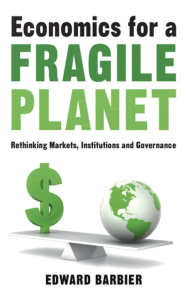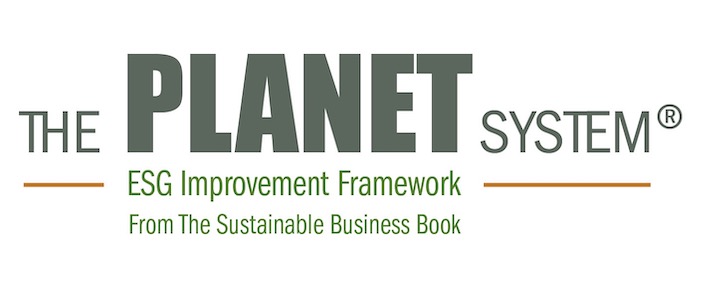 ECONOMICS FOR A FRAGILE PLANET – Edward Barbier
ECONOMICS FOR A FRAGILE PLANET – Edward Barbier
The one-sentence summary: Managing an increasingly fragile planet requires new thinking on markets, institutions and governance – we need to phase out environmentally harmful subsidies, impose taxes, regulations and market-based incentives to reduce damage, and use the revenues to support green innovation, investment and conservation.
WHAT THE BOOK SAYS
- This new thinking should be based on five principles: ending the underpricing of nature, fostering collective action, accepting absolute limits, attaining sustainability and promoting inclusivity. It requires decoupling wealth creation from environmental degradation through business, policy and financial actions aimed at better stewardship of the biosphere.
- The book analyses the scientific evidence in relation to planetary fragility, climate change, land use and biodiversity, freshwater, and oceans and coasts. It defines 5 eras that define our relationship with nature: the rise of agriculture from 10,000 years ago; the emergence of global trade and the world economy 1000–1500 AD; the period of global frontiers 1500–1750; the fossil fuel age 1750–1970; and The Great Acceleration 1970–present.
- We don’t know exactly what happens when Earth system thresholds are crossed, but one possibility is that The Great Acceleration will lead to a catastrophic Anthropocene.
- We need to address 3 critical questions:
-
- How do we reduce impacts to ensure a safe Anthropocene and what are the implications?
- How do we design and run our economies to avoid and mitigate environmental risks?
- What policies are required to decouple wealth creation and economic prosperity from environmental degradation?
- At the heart of the concept of sustainability is intergenerational equity – to ensure that future generations have the same levels of economic opportunities and wellbeing that we currently enjoy.
- A green economy results in improved human wellbeing and social equity, while significantly reducing environmental risks and ecological scarcities.
PARTICULAR POINTS OF INTEREST
- Natural ecosystems have declined by a half in the last 50 years. Current rates of land use change merely represent managed decline.
- Between 1950 and 1970 the global marine catch tripled, and over 99% of formerly important species have been depleted.
- Only 3% of the world’s water is fit for human consumption and 99% is either frozen or underground. Water development has become the hydraulic mission of the modern era – to meet every new demand for water. Blue carbon habitats such as marshes, mangroves, sea grass beds etc. are among the most prolific carbon sinks on earth, but there is growing alarm over ocean and coastal grabbing.
- Excessive trawling of the seafloor results in 1.7 bn tonnes of CO2 being released – as much as the entire aviation industry.
- Human impacts should be kept within planetary boundaries to avoid triggering tipping points or thresholds that can lead to irrevocable changes in the entire Earth system.
- Economist Kenneth Boulding in the 1960s argued that the Earth is finite (a concept he called “Spaceship Earth”). He suggested that we need to transition to a spaceship economy that respects those limits. By contrast the cowboy economy is reckless, exploitative, romantic and violent, based on the principle of unending frontiers.
- The total capital stock of the world is: physical capital (roads, buildings etc.), human capital (skills, education in a workforce); and natural capital (land, forests, water etc.), sometimes called ecological capital. Natural capital provides us with ecosystem services.
- The social cost of carbon is a measure of all future damages associated with a tonne of GHG emissions, translated into today’s money. This is how we should tax emissions.
- We have yet to see signs of a major energy transition away from dependency on fossil fuels. The main reason, believes Dieter Helm, is the underpricing of fossil fuels. We need to phase out harmful fuel subsidies, as well as those in fishing and agriculture.
- Underpricing of the natural landscape leads to what economists call rent seeking. If natural resources are simply viewed as a reserve to be tapped, the costs of exploitation are considered negligible, but the profits (or ‘rents’) are substantial. This combines with the underfunding of nature to contribute to a broken system.
WHAT YOU HAVE TO WATCH
- This is a serious academic book running to 300 pages, and so could be too much work for the casual reader.





Leave A Comment
You must be logged in to post a comment.